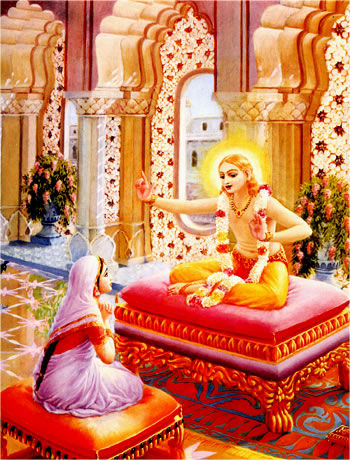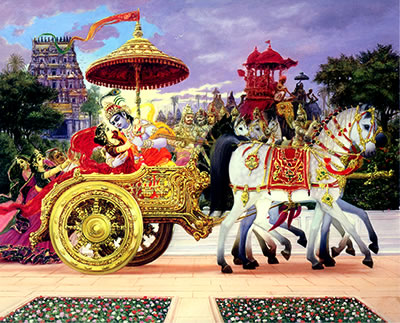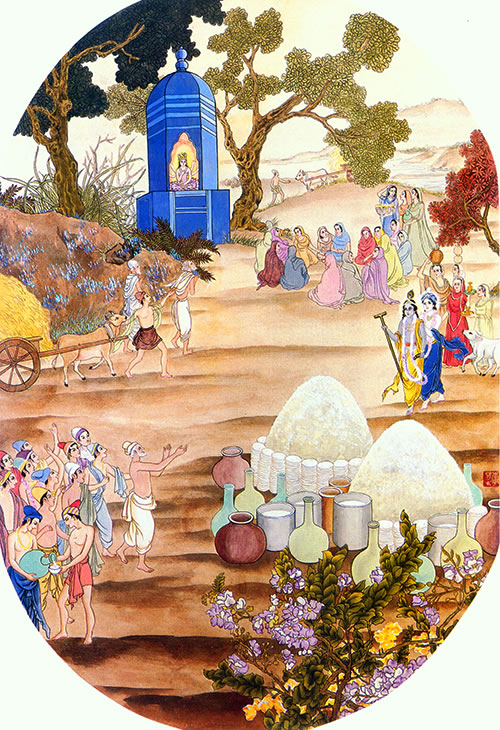Prashna
One of the most useful and dynamic branches of Vedic astrology is Prashna, which literally means question. This is called Horary Astrology in the West. We again remind you of the metaphor of photography, in which a Natal chart reading is like using a wide-angle lens. One gets the full view, but it seems far away, and one cannot see all the details. To get more detail one could zoom in and look at a smaller segment of time, say, the duration of a planetary major period or, even smaller, the planetary sub-period, or perhaps a year or six months. The real close-up shot or microscopic view would be to focus just on one question for a specific period of time. This is prashna.
Imagine parents of a traditional Indian household, who meet a particularly qualified girl who perchance is the perfect match for their son. But they don't want to make any commitment just yet or reveal their intentions; thus they certainly don't want to jeopardize their interests by directly asking for the girl's birth particulars. What to do? After suitably pondering the situation, they would ask a Vedic astrologer the question: What will be the result for my son if he marries girl X? The Vedic astrologer notes the time the question is asked, calculates the chart, analyzes it, and then gives a scientific answer.
How does it work? The conception of a question is the thought which enters one's mind. Pondering, worrying, and brooding over it is the gestation period. And asking is the birth of the question. You might be surprised to learn how accurately a trained astrologer is able to zero in on the correct answer.
-
You may also be interested in:
- Ashtamangala Deva Prashna
- From the Astrologer’s Diary: The Night Dacoits Stole Srimati Radharani
- Life of Govinda Bhattathiri, ]yotish Acarya
- Are There Different Sizes of Infinity?
Of course prasna is not limited to romantic ponderings, but can be applied to almost any situation wherein humans have questions. It is the perfect tool for making strategic and tactical decisions.
The following list is a small sample of the thousands of questions I have been asked in the course of my practice. I have chosen them to show the wide variety and almost endless application that is limited only by one's own imagination and personal experiences:
Which of the following three places, A, B, or C, is the best place to sink a well?My daughter is missing. Is she all right? When will she return?
Who murdered the victim; what can you tell me about the murderer?
Should I move to Los Angeles next month?
Should I file a legal suit against X?
Should I hire X as my lawyer?
Will the IRS come after me?
Should I hire X as my building contractor in my real-estate development project?
Should I go into partnership with X?
Will Y country attack X country?
Will X win the election?
My health isn't good. The doctor recommended some treatment; should I do it?
I have lost my wedding ring; will I recover it?
What is the sex of my unborn child?
Should I take [spiritual] initiation from X?
Should I purchase the land in India?
Should I marry X?
In which direction did the missing person go?
What is a good direction to move (find a job, find a spouse)?
Are you wondering what are the best Vedic astrology books to read? Then visit our recommended reading list for serious students of astrology.
Many people have heard of prasna and its power; but unfortunately they cannot always take advantage of it for two reasons:
- Prashna is very difficult to perform, and it requires extensive special training. Even an astrologer capable to adequately read a natal chart will not be able to do a prashna chart properly unless trained to do so, because there are special rules in prashna that are not applicable to natal astrology, and vice versa.
- The person fails to ask the question properly. Even a properly trained astrologer will not be able to answer an ill-conceived question.
In the first case, the seeker should carefully ascertain if the astrologer he is dealing with has had any special training in prasna. If he has not had this special training yet is consulted, the results could be disastrous. I know of one case in which a woman asked a well regarded West coast astrologer the question: "Should I approach the man I am interested in?" The untrained (in Prasna) astrologer told her yes. But it was likely the worst mistake of her life; it led to a major scandal, forcing her to leave town in a rush, hurriedly giving away all her possessions. The astrologer was untrained in prasna, so he did not charge her much; but it turned out to be a very costly consultation indeed. It cost her thousands of dollar plus the complete ruination of her reputation. The pity was that when she showed me the prasna chart, it was obvious that she should not have gone forward.
The second case simply requires some basic training on the part of the seeker as to how to ask a prasna.
The importance of correctly formulating a question cannot be overstated.
How to Ask a Prashna
I have done literally tens of thousands of prasnas since 1981 and the results are amazingly accurate provided the seeker follows a few simple rules when asking a question. The importance of correctly formulating a question cannot be overstated. In ancient Greece, the Oracle of Delphi was famous for giving accurate answers. But sometimes the answers were so enigmatic that no one could understand them, the reason being that the question itself was unclear. The astrological texts also state that the questions of certain persons should not be entertained:
- One who asks in a casual or nonchalant manner
- One who uses abusive language while asking
- One who is a heretic or atheist
- One who comes empty-handed
- One who is proceeding on a journey
- One who is answering the calls of nature
- One who asks questions at dusk
For formulating a question to get a clear unambiguous answer, consider the following guidelines:
- First, prepare yourself mentally, physically and spiritually.
- It is important to take time to clear your thoughts. Breathe deeply, slowly, to relax. Allow your question to clarify itself freely, unencumbered by life's expectations.
- Pray to Krsna (God) that He will reveal His answer to you through the astrologer.
- Keep your mind clear, and meditate on your question. If your mind is confused and you are thinking of many different questions at once, then the chart will reflect your nebulous state of mind and be exceedingly difficult, if not impossible, to answer. This can be likened to a woman who gives birth to five or six children at one time; the survival of any of them is doubtful.
- Ask only one question at a time. If you have other questions, see next point.
- Don't ask more than three questions in one day. If you have more than one question then wait for at least 30 minutes before asking it. Don't send them back to back, but rather take time to clear your mind and deeply meditate on each one. (Brghu Muni says that it is best to approach the astrologer with only one question, of an auspicious nature.)
- It is necessary to formulate a clear, truthful question in one's mind, getting right down to fundamentals and leaving out irrelevant details which can be added later if necessary, possibly by asking further questions. Decide exactly what it is that you wish to know. The clearer the question, the clearer the answer will be. A vague or ambiguous question will be reflected in the prashna chart, and it will be impossible to answer.
- Always write down your question before asking the astrologer. This forces you to think clearly and concisely. The question should be formulated into one sentence--not a novel.
- Don't ask convoluted questions. Keep them as straightforward as possible.
- Don't ask open ended questions like "what should I do with my life?" Or, "what type of work should I do?" There are literally tens of thousands of possible answers to these types of questions. Though some ideas might be gleened from the prasna these type of questions would be much better investigated in a natal chart reading. You could however ask a strategic question like "Should I go back to school?" Or, "should I become a lawyer?" These are focused close ended questions that are relatively easy for a trained astrologer to answer via prasna. Remember prasna is for a microscopic view whereas Natal chart reading are for the panoramic view of your life. Use the right tool for the right job.
- Ambiguous, "either/or" questions must be avoided; otherwise, one cannot know which part of the question has been answered. Better to divide into two or more questions and ask them at separate intervals, as mentioned above.
- Similar to the "either/or" question is the "if/then" question; it also must be avoided. However "if/when?" is ok.
- To avoid confounding the meaning of an answer, one should be careful to ask questions in the positive, rather than the negative, attitude. For example:
Correct way:
Question: "Should I visit Mr. X?"
If the configuration of the chart is positive, then the answer will be yes--otherwise it would be no.
Incorrect way:
Question: "Should I remain at home and not visit Mr. X?"
If the configuration of the prasna chart is positive, does it mean that you should stay at home? Or does it perhaps mean that you should actually go to visit Mr. X? Which is correct? Or if the configuration were negative, does it mean that you should not visit him? Or does it perhaps mean that you should not remain at home? Which is correct?
An example of a convoluted question that would be impossible to answer is as follows: "Should I get into the herbal import business? If not, then should I get into real estate, or move back to England?"
"Shyamasundara's calculations are rarely, if ever, wrong." Indradyumna Swami, Diary of a Traveling Preacher; Volume 5, Chapter 3
"I have derived great benefit and help from your readings and advice over the years and I hope to continue to do so. Astrology is a great science and I think you have mastered it." Sriman Hari Sauri Prabhu
The above example uses the "either/or", "if/then," and negative attitude. It should be divided into a series of questions, beginning first with, "Should I get into the herbal import business?" Depending upon the answer, the person would then ask the next question. In any case, one should not jumble so many questions into one.
- Do not ask the exact same question within a three-month period (to the same astrologer); allow time to act. Sometimes people don't like the answer they get, so they keep asking the same question hoping that they'll get a better answer. Or they are impatiently waiting for results to arrive. This is actually disrespectful to God. Don't forget that we are doing divination, that is, approaching God for our answer through the astrologer. (It can also be very irritating to the astrologer.) This rule can only be broken if a major change in circumstance has taken place.
- If your mind is set upon getting only a certain answer, then you should wait before asking the question. In other words, if you want only a "yes" and not a "no" to a question, then you are not really prepared to receive the mercy of God via the astrologer's reply. You must realize that which ever answer He gives (through the astrologer) is in your best interest, even a "no." If you are attached to receiving only one answer, then you are not really open to divine guidance. And the answer which you want could actually lead you to disaster.
- Don’t assume something will happen and then ask "when will X happen?" For certain events in life like getting a job or especially marriage people just assume that it will happen so they innocently ask the ask the prasna: “when will X happen?” But that is a false assumption, it may never happen. Instead of asking “when will I get married?” You should instead ask: “Will I get married?” If the answer looks positive we can then consider when it might occur. Obviously if you are not destined to get married or win the lottery or become a Hollywood actor then “when will it happen?” becomes absurd. So keep that in mind. Don’t assume something will happen when you ask a prasna.
- Some questions may have options which appear to be like multiple questions but are actually only one question. Suppose a person wanted to move to a different location and had several different options in mind. The questioner should try to narrow his choices as far as possible, with the understanding that he is allowed up to three (3) options. Then he should write on paper: Should I move to 'A', 'B', or 'C' (where A, B, and C represent the names of the places he is considering)? When asking the astrologer, he needn't even reveal the actual names of the places, as long as he knows what they mean. But this method of using options can be used only when A, B, and C represent the same category of entity (in this case, locations). If the seeker has more than three options, then he will have to ask more than once in order to cover all the options. This option method only relates to choices of actions that you perform and not to things that might happen to you, or other people or entities. You, of course, can ask these types of prasnas, but NOT by using the options format.
- You don't have to directly name an object or person you can just call it or them "X" to maintain confidentiality.
With these simple pointers, you now know how to ask questions properly in order to get a clear answer: perfect questions, perfect answers. If you still have a doubt or something is not clear please feel free to contact me and I will be happy to assist you.
Example of Prashna
Before we leave the subject of prasna, I would like to give an example from my files as to how it is used. In December of 1988, I received an urgent call from a friend. His mother-in-law had just been rushed to the hospital to undergo emergency surgery for diabetes related problems. The woman, an aged, traditional Indian lady, would not sign the consent forms until I was consulted and had given approval. I had noted the time of the call, so with that I began my calculations. My conclusion was that her condition was serious but not life-threatening. My client then conveyed this report to his wife and mother-in-law. But soon after, I received another call from my client: "Are you sure? The condition is very serious, and my wife is doubtful." To alleviate her anxiety, I called the hospital emergency room to ask the wife why she was doubtful. She answered that the doctors had privately told her that her mother had less than a 5% chance of survival; naturally she had trouble reconciling this with my assurance that the surgery would be successful. I looked at my calculations again and saw no indication of death. So I told her, "If your mother dies during or because of the surgery, I will not be able to explain it astrologically. If that happens, I will give up the practice of astrology." I was serious. My conviction was so firm that the wife's mother then signed the consent forms and underwent surgery. Later that day when I came back to my apartment, I found a message on my answering machine: "Shyama, you don't have to give up astrology, my mother survived and is doing fine."
Read Well, It’s a Crazy Story which shows prasna in action and how it saved a woman from making a seriously bad decision.
For more information on Prasna see Astamangala Deva Prashna.
I want to ask a Prashna.
The above link will also show other services that we offer.
Read What is Vedic Astrology? to find out more about Vedic Astrology the super-science and what it can do for you.
The comment area below is to discuss about the science of prasna but not to ask your own personal prasnas. Such comments will be deleted. If you are serious about asking a prasna then fill in the prasna form. Thank you for understanding and for keeping the comment section focused on its original purpose.


